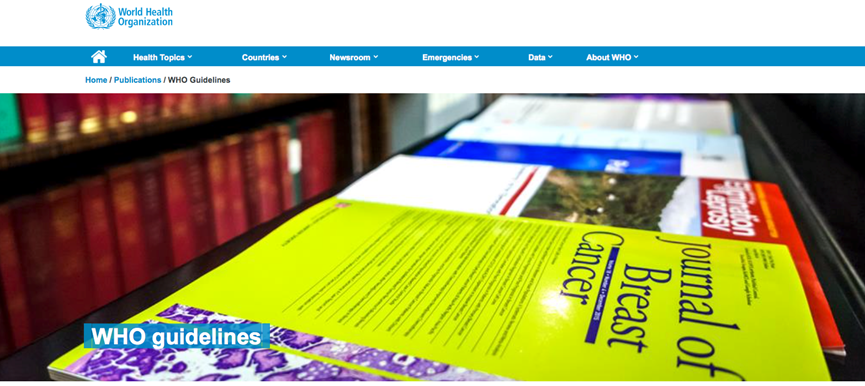World Health Organization published a collection of global guidelines
 A WHO guideline is defined broadly as any information product developed by WHO that contains recommendations for clinical practice or public health policy. Recommendations are statements designed to help end-users make informed decisions on whether, when and how to undertake specific actions such as clinical interventions, diagnostic tests or public health measures, with the aim of achieving the best possible individual or collective health outcomes.
A WHO guideline is defined broadly as any information product developed by WHO that contains recommendations for clinical practice or public health policy. Recommendations are statements designed to help end-users make informed decisions on whether, when and how to undertake specific actions such as clinical interventions, diagnostic tests or public health measures, with the aim of achieving the best possible individual or collective health outcomes.
The development of global guidelines ensuring the appropriate use of evidence represents one of the core functions of WHO. In order to make better use of existing WHO resources, to ensure that WHO guidelines are developed in a systematic and transparent manner, and to improve the quality of WHO guidelines, WHO Director-General Margaret Chan approved the establishment of the Guidelines Review Committee (GRC) in 2007 to review guideline plans and final guideline drafts. The Guidelines Review Committee ensure that WHO guidelines are of a high methodological quality and are developed through a transparent, evidence-based decision-making process. Guidelines are subject to a rigorous quality assurance process that helps to ensure that each and every published guideline is trustworthy, impactful and meets the highest international standards.
In response to the diverse health issues facing people worldwide in achieving high levels of health, WHO has published thousands of guidelines covering different aspects of clinical and public health. To facilitate navigation through these various guidelines, WHO has compiled a list of various guidelines related to COVID-19, public health and health policy management approved for publication by the GRC since 2008 to 2022, which are currently available in the National Library of Medicine. The list of WHO guidelines can be found at https://www.ncbi.nlm.nih.gov/books/NBK132015/.

